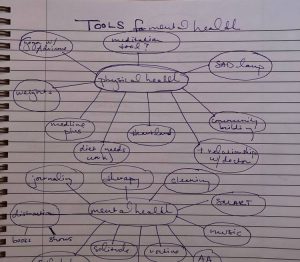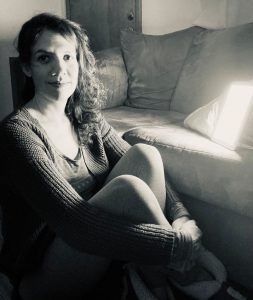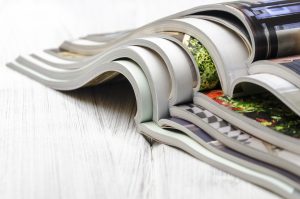Sometimes mental wellness can feel like a slippery fish, here one minute and disappearing into murky waters the next. Where did the lovely little fish of health, moving with fluidity and grace, with assuredness and well-being, go exactly?
2020 debited quite a bit from the "energy and emotional bank", but after a history of struggles, I know that my toolbox of coping skills is seeing me through and will hopefully be of use to others in my work.
Our minds are vast, powerful, and intricate entities. Ways of harnessing their complexity on a practical level, towards health and to weed out unhelpful thoughts and patterns, can only serve our capacity for growth as human beings.
The thing is, we really do understand parts of ourselves, what health looks like and what it doesn't. Wisdom is there, it just takes sifting through layers, sometimes several, when we've gone through some sh*t and are still moving through unprocessed pain. For those of us who hold mystery like water, don't worry, there's plenty of it to account for our individuality and sometimes neurotic behavior (I think of Larry David endearingly: “I don’t like to be out of my comfort zone, which is about half an inch wide.” and "There's nothing that reflects me! I'm unreflectable!")
What is health? It's connection, understanding, stimulation, and creativity. It's love and respect and care, both outgoing and incoming. And yet, we also have these beautifully fallible human bodies that sometimes stutter where bodies talk, and that are simultaneously adaptive and replete with chinks in the armor of our systems.
Given all this, I’ll speak from my “lived experience” with tools geared towards mental wellness. Lived experience is Peer Support lingo for how someone (often it takes some training) communicates their own past or current suffering in a way that is useful and hopefully comforting or energizing to the person they are serving.
"We shape our tools and afterwards our tools shape us." -Marshall McLuhan, Canadian Philosopher
Most of these I’ve used either in my twenties when things were darker or more recently and found very useful:
-
Boundaries: did you know that there are four (or five) parts to good boundary setting? I learned this in Peer Support training. Credit to Jay Schulz at the University of Kansas who is currently writing his dissertation on this topic. 1) listen (really really), 2) reflect back the request/need and validate it (e.g. "it's totally understandable to want to be in a romantic relationship"), 3) set a clear boundary (don't make excuses, just be direct), and 4) redirect the person and/or say what we CAN do for the person. (and 5: repeat steps 3 and 4 as needed, if interacting with someone who isn't getting your drift)
-
SAD lamps: Check one out at: https://lawrence.bibliocommons.com/v2/record/S119C288653. If they're all checked out, put one on hold, it's worth it. The book that got me interested last year and basically (no kidding) turned me into a morning person:
https://lawrence.bibliocommons.com/v2/record/S119C354498 These cold and grey days are just no fun and need some light.
-
MyStrength: Free when you enter “douglascounty” as your access code. https://mystrength.com/ Lots of psychoeducation and tracking tools for your sleep, mood, eating, etc. Stuff to help you through COVID-related stressors too.
-
KSPQ (Kansas Suicide Prevention Headquarters): for when you’re in crisis, suicidal or otherwise (meaning you don’t have to be suicidal to call), and don’t have anyone to talk to (or are afraid of burdening loved ones): (785)841-2345 https://www.ksphq.org/help/
-
SMART Recovery: zoom meetings if you want support with any kind of addiction Wednesdays and Fridays at 5pm: https://lawrence.bibliocommons.com/events/search/q=smart%20recovery&fq=audiences:(59a981a6d90abefd2aa86fc9) or call the SMART phone line 7 days a week 4-8pm (785)550-0764 for one-on-one confidential counseling.
-
Peer Support: at tbird@lplks.org or call at (785)256-0052 to leave a message in Theresa's (me) voicemail. Calls are just fine! No one else listens to the voicemail messages but her. Set goals, use peer support as a sounding board for next steps, or explore resources that will get you feeling better, including what therapy looks like and how to advocate for what you need.
-
Distraction: w/magazines and NYTimes subscription! Did you know you can check out magazines at the library? Like, real paper ones where you can flip the pages as you lounge lazily and periodically sip coffee and wonder if you're a "productive" person? I check out 3 or 4 at a time and love having them around. You can also read the New York Times newspaper for free online with your library card. https://lplks.org/ny-times-instructions/
- Purchase requests: patrons can place 3 per month. If you have a specific mental health or other struggle and a book that you’d think would be helpful, suggest it! I’ve placed several as a patron, about depression, grief, the holocaust, and suicide loss (you know, lighter reading!) and they're now included in our collection. https://lplks.org/purchase-request/
There will be a time when we'll see each other, full-face see each other again. We’ll dance together, we’ll drink together (though not me, I love it too much), we’ll look back, scratch our heads, and think: oh man, that was bad. Real, real bad. And for some, the healing will take much much longer and is an altogether different process, given the enormous losses.
But right now, I see a big part of our time as a puzzle whose pieces are slowly fitting together using our ingenuity, resources, and human connection, to re-stabilize and improve our collective mental health.
Constant movement forward with macro-level health won't be left aside in this process, either.
-Theresa Bird is a Peer Support Services Assistant at Lawrence Public Library.





Add a comment to: We Shape Our Tools and Afterwards Our Tools Shape Us